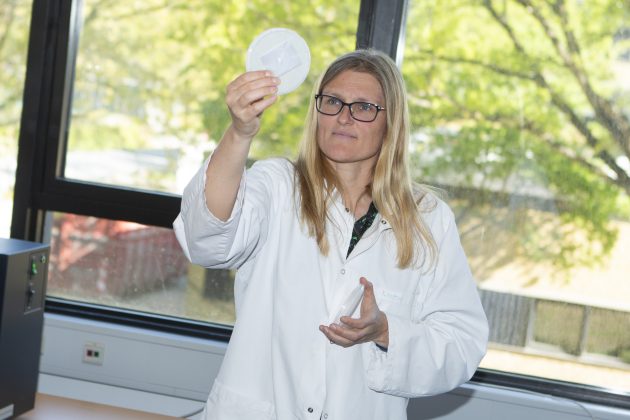Professor Anne Ladegaard Skov is receiving a grant of DKK 48 million from the Novo Nordisk Foundation for developing artificial muscles made from silicone and spider silk.
In the future, people with mobility difficulties, such as those caused by old age or illness, could put on a lightweight garment that will act as their muscles and help them lift a shopping basket and make many other activities of daily living more manageable.
The garment will look quite ordinary but will be made from a combination of spider silk, other biological materials and silicone, which will harness electrical energy to enhance the strength of the person wearing the garment.
This is the idea behind a major research project for which Anne Ladegaard Skov, Professor, Department of Chemical and Biochemical Engineering at the Technical University of Denmark, has received a grant of DKK 48 million from the Novo Nordisk Foundation’s ambitious Challenge Programme. She has been working for many years to develop artificial muscles from silicone and is now taking the final steps to realise this goal.
“Every grant brings us closer to the goal of creating something that can benefit people, and when we receive such a major grant for our research, we can explore more adventurous ideas with even greater potential,” says Anne Ladegaard Skov.
The grant has been awarded to Anne Ladegaard Skov and colleagues Herbert Shea, Swiss Federal Institute of Technology, Lausanne, Switzerland and Neel Joshi, Northeastern University, Boston, USA.
Material must be light and strong
Today, researchers can easily make a garment that can harness electrical energy that enables the wearer to move.
Electrical energy causes the silicone fibres in the material to contract and the material then moves.
However, the technology is not advanced enough for the person wearing the garment to lift a shopping basket or other heavy items.
Conversely, researchers can make a garment that can lift heavy objects, but then people are not wearing garments but a heavy robot.
Anne Ladegaard Skov’s research project aims to integrate the properties of being lightweight and strong into one material.
“Our first version will be like putting on a wetsuit, but in the long term we want to develop something that will be like a thick cotton sweater. We have to make something that is so soft that you do not feel that you are wearing it, but it must still harness so much energy that it can be used functionally,” explains Anne Ladegaard Skov.
Combining silicone and spider silk
The researchers will combine various materials to achieve the necessary properties.
These include silicone, which is soft and flexible, and spider silk produced by bacteria, which is strong and has fantastic mechanical properties in being able to contract.
The inert silk could be incorporated into the fabric, but the researchers will also examine whether the bacteria that make the silk could be incorporated into the fabric itself – thereby enabling any damage to the material to be self-repairing.
Last but not least, a battery pack must provide electricity to the material so that it has the necessary energy to perform mechanical work.
Then, if a person wearing the garment attempts to pick up a shopping basket containing 10 litres of milk, the act of flexing the biceps signals to the fibres in the garment that they must contract, and as they do this, the arm is raised.
“Our overall idea is that we will incorporate many biological fibres into our silicone so that the material has all the necessary properties. Our greatest challenge will be to get enough strength into a soft material for it to function, but I am convinced that we can solve this problem over the next 5 years,” says Anne Ladegaard Skov.
About the Challenge Programme
The Novo Nordisk Foundation established the Challenge Programme in 2014. Since then, the Foundation has awarded more than DKK 100 million every year for ambitious research focusing on global challenges.
The Challenge Programme targets research projects based on a thematic approach addressing some of the major societal challenges.
In 2022, the Challenge Programme awarded grants to six researchers for at total amount of DKK 337 million. Read about all the grants here.









